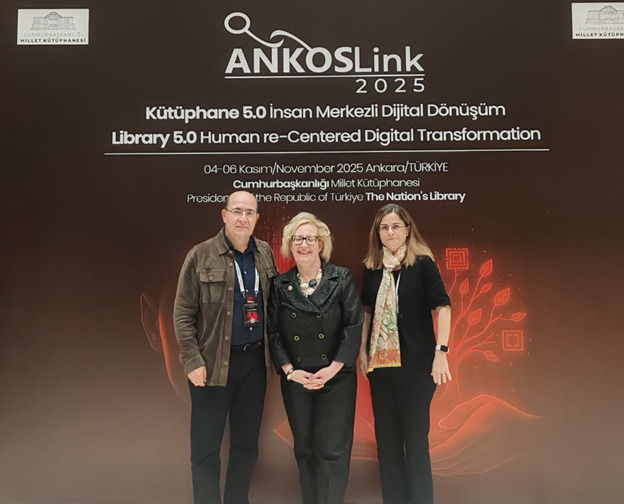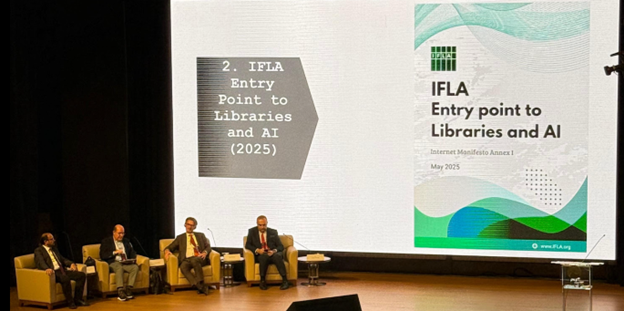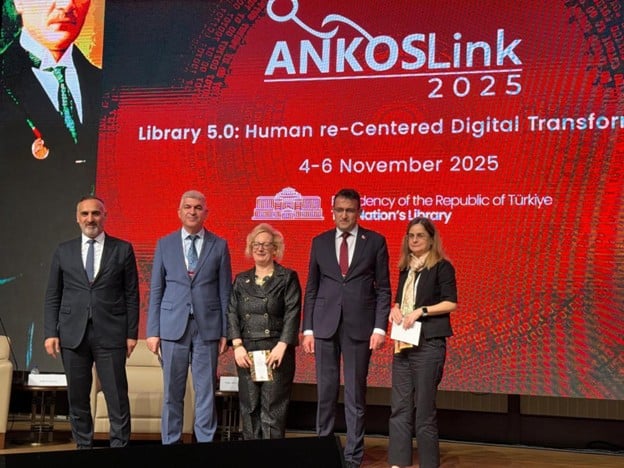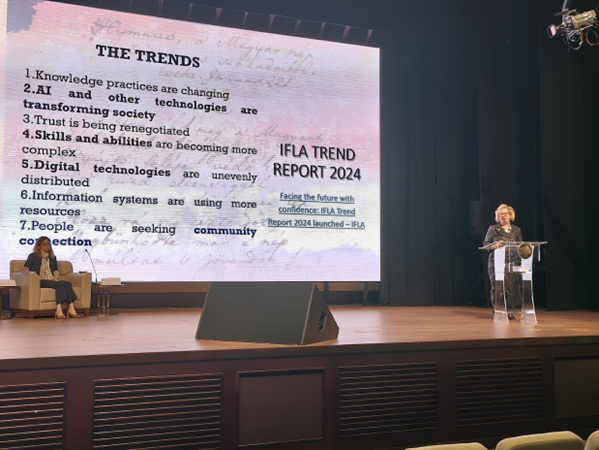Library 5.0 and Regional Leadership: IFLA Perspectives at ANKOSLink 2025,
11 November 2025
The ANKOSLink 2025 Conference, held from 4 to 6 November 2025 at the Nation’s Library in Ankara (Türkiye), brought together over 600 participants—including library professionals, academic leaders, researchers, and technology experts— from 30 countries to explore the future of knowledge access in a rapidly evolving digital landscape.
The conference featured sessions on AI integration, scholarly communication, digital transformation, and regional collaboration, with a strong emphasis on human-centered innovation.
The event concluded with a high-level closing session featuring speeches by Minister of Culture and Tourism Mehmet Nuri Ersoy and President of the Republic of Türkiye, Recep Tayyip Erdoğan, underscoring the national commitment to empowering libraries as strategic actors in education, culture, and technology.

Library 5.0 and Regional Leadership in Focus
Representing IFLA’s global and regional leadership, Ertuğrul Çimen, Tuba Akbaytürk, and Judit Gerencser contributed to sessions that reflected the Federation’s commitment to inclusive innovation, strategic foresight, and cross-regional learning.
As Chair of the IFLA Regional Council and Governing Board Member, Ertuğrul Çimen emphasized the importance of human-centered innovation and ethical leadership in AI integration. Drawing from IFLA’s global initiatives—including the IFLA Statement on Libraries and Artificial Intelligence and the Entry Point to Libraries and AI—he highlighted the role of professional associations in shaping responsible digital transformation. He also spotlighted Türkiye’s ANKOS AI Research Group as a regional model for collaborative learning and ethical guidance.
In addition, he referenced frameworks from ACRL and CILIP that promote ethical literacy, futures thinking, and inclusive service design. These frameworks support librarians in navigating the ethical and strategic dimensions of AI. He underscored that in the age of AI, librarians must act not only as technology users but as ethical mediators and innovation catalysts, guiding institutions through complex digital transitions.

Tuba Akbaytürk, Chair of Division F, moderated the session titled Library 5.0: Human-Centered Services, which brought together national and international leaders to explore empathy-driven and inclusive library practices. In her remarks, she emphasized the transformation of library services in response to societal needs, highlighting the importance of user experience, ethical design, and community engagement. She advocated for libraries as safe, participatory, and adaptive spaces that support lifelong learning and social cohesion.
 Judit Gerencser, Information Coordinator of the Europe RDC, presented a compelling case study from Hungary, focusing on the transformation of the National Széchényi Library through the lens of Library 5.0. Her presentation explored how national libraries are evolving into human-centered ecosystems, integrating AI, digitization, and participatory design to serve cultural memory and community needs. She emphasized the role of libraries in fostering 21st-century competencies such as empathy, adaptability, and ethical reasoning. Judit also referenced the IFLA Trend Report 2024, outlining global shifts in trust, skills complexity, and digital equity—reinforcing the need for libraries to remain agile, inclusive, and values-driven.
Judit Gerencser, Information Coordinator of the Europe RDC, presented a compelling case study from Hungary, focusing on the transformation of the National Széchényi Library through the lens of Library 5.0. Her presentation explored how national libraries are evolving into human-centered ecosystems, integrating AI, digitization, and participatory design to serve cultural memory and community needs. She emphasized the role of libraries in fostering 21st-century competencies such as empathy, adaptability, and ethical reasoning. Judit also referenced the IFLA Trend Report 2024, outlining global shifts in trust, skills complexity, and digital equity—reinforcing the need for libraries to remain agile, inclusive, and values-driven.
 ANKOSLink 2025 Highlights
ANKOSLink 2025 Highlights
Held at the Nation’s Library of Türkiye, ANKOSLink 2025 brought together hundreds of professionals to explore the intersection of technology, ethics, and regional collaboration. The panel featuring IFLA leaders reflected the Federation’s commitment to empowering libraries through strategic foresight, cross-regional learning, and inclusive innovation.
Authors
Ertuğrul Çimen (Chair, IFLA Regional Council & Governing Board Member) Tuba Akbaytürk (Chair, Division F) Judit Gerencser (Information Coordinator, Europe RDC)